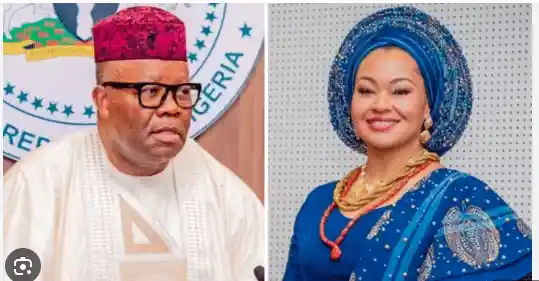BREAKING: Court Gags Akpabio, Natasha Akpoti-Uduaghan, and Senate from Public Comments on Pending Misconduct Case
- Advertisement -
In a dramatic legal twist, the Federal High Court in Abuja has issued a sweeping gag order barring Senate President Godswill Akpabio, Senator Natasha Akpoti-Uduaghan, the Nigerian Senate, and their legal representatives from making any public statements—whether through press interviews, television appearances, or social media posts—regarding the ongoing case surrounding Akpoti-Uduaghan’s suspension.
Justice Binta Nyako handed down the ruling on Friday, imposing a “total media blockade” on all parties involved until the case is resolved. The decision comes amid escalating tensions between Akpoti-Uduaghan and the Senate leadership, following her six-month suspension over alleged misconduct.
Court’s Directives: A Complete Media Blackout
Justice Nyako’s ruling explicitly prohibits:
– Press interviews discussing the case.
– Television appearances analyzing the matter.
– Social media posts commenting on the proceedings.
– Live streaming or media commentary by any involved party or their lawyers.
- Advertisement -
Also Read : Godswill Akpabio is not only corrupt but also in the habit of abusing women – Atiku Abubakar (Watch Video)
The judge emphasized that the order was necessary to prevent “prejudicial publicity” that could undermine the integrity of the judicial process. She adjourned further hearings to May 12, 2025, urging all parties to maintain decorum until then.
How the Legal Battle Unfolded
The case stems from a February 2025 altercation in the Senate, where Akpoti-Uduaghan (representing Kogi Central) was asked to change her seat during plenary. The dispute escalated when she accused Senate President Akpabio of making “inappropriate advances” toward her during a private visit in December 2023—a claim Akpabio has vehemently denied.
- Advertisement -
On March 6, 2025, the Senate suspended Akpoti-Uduaghan for six months, citing violations of legislative rules. She swiftly challenged the suspension in court, filing a lawsuit against:
1. The Clerk of the National Assembly
2. The Nigerian Senate
3. Senate President Godswill Akpabio
4. Senator Neda Imasuen, Chairman of the Senate Ethics Committee
Legal Maneuvering: Withdrawal, Reassignment, and Urgency
The case initially before Justice Obiora Egwuatu was reassigned to Justice Binta Nyako after one of the defendants alleged bias, prompting Egwuatu’s recusal. At Friday’s hearing, Akpoti-Uduaghan’s lawyer, J.S. Okutepa (SAN), argued that the six-month suspension was already causing irreparable damage to her legislative duties and demanded an expedited resolution.
- Advertisement -
However, Kehinde Ogunwumiju (SAN), representing Akpabio, countered by accusing Akpoti-Uduaghan of prejudicing the case through media appearances on BBC and CNN. Okutepa fired back, pointing out that another Senator (from the South-East) had also been discussing the matter publicly.
Justice Nyako’s ruling effectively silenced both sides, ensuring that the case is decided in court—not in the media.
Reactions: Mixed Responses from Political and Legal Circles
The gag order has sparked sharp reactions:
– Supporters of Akpoti-Uduaghan argue that the Senate’s suspension was politically motivated and that the media ban stifles transparency.
– Pro-Akpabio lawmakers insist that the suspension was a disciplinary measure, not an attack on free speech.
- Advertisement -
– Legal analysts are divided—some praise the court for protecting judicial integrity, while others warn that such restrictions could set a dangerous precedent for silencing dissent.
Human rights lawyer Femi Falana (SAN) commented: “While courts have a duty to prevent trial by media, they must also balance this with the constitutional right to free speech. This ruling must not be used to suppress legitimate grievances.”
Broader Implications: A Test for Nigeria’s Democracy
This case highlights three critical issues:
1. Legislative Discipline vs. Free Speech – Should lawmakers face sanctions for speaking out, or does this discourage accountability?
2. Judicial Intervention in Parliamentary Affairs – How far should courts go in reviewing legislative decisions?
3. Media and Fair Trials – When does public commentary cross the line into interference?
Akpoti-Uduaghan’s suspension has also reignited debates about gender dynamics in Nigerian politics, with some alleging that she is being targeted for challenging a powerful male leader.
What’s Next?
With the May 12 hearing looming, key developments to watch include:
– Whether the Senate will reinstate Akpoti-Uduaghan before the case concludes.
– If any party violates the gag order, risking contempt charges.
– The potential for out-of-court settlement negotiations.
A High-Stakes Legal and Political Showdown
This case is more than just a personal clash—it’s a litmus test for Nigeria’s democracy, examining the balance between legislative authority, judicial oversight, and press freedom. As the legal battle unfolds behind closed doors, the nation waits to see whether justice will be served—or if political power will prevail.
Stay tuned for further updates as this story develops.
- Advertisement -


